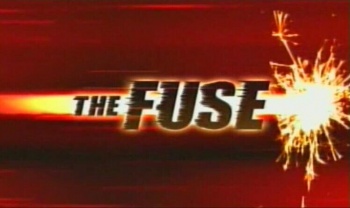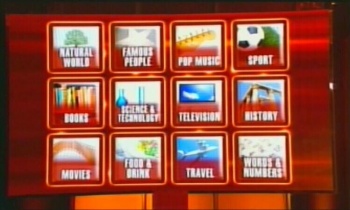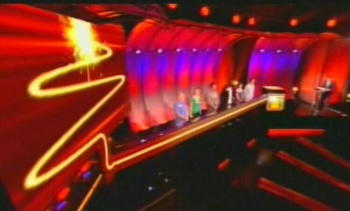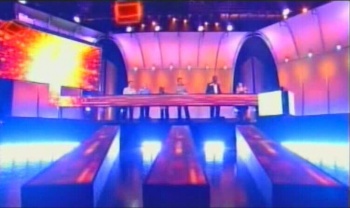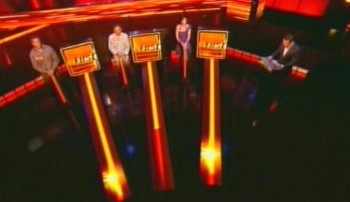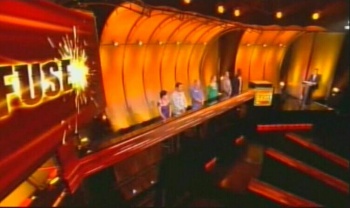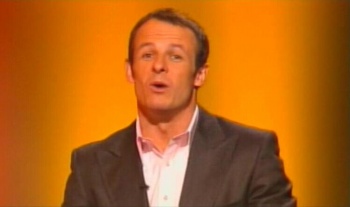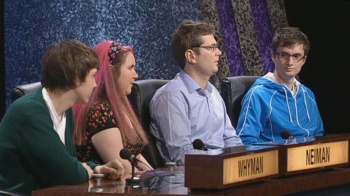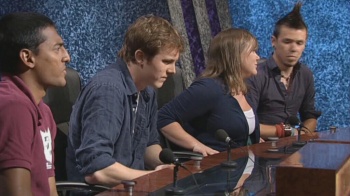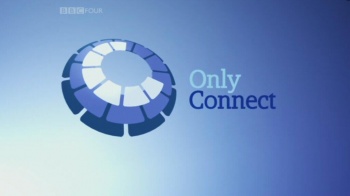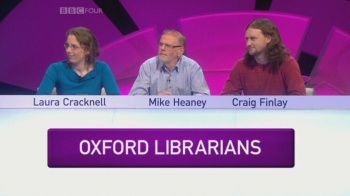Weaver's Week 2009-07-19
| Line 136: | Line 136: | ||
|} | |} | ||
== This Week And Next == | == This Week And Next == | ||
| - | The BBC released its annual reports this week. Amongst game shows, [[Last Choir Standing|Last Choir Standing]] was praised as "a different entertainment event" that "reflected diverse communities". [[Maestro|Maestro]] was one of BBC2's "most talked-about shows of the year", we suspect mostly from people wondering just what Peter Snow was doing. [[Who Wants to be a Superhero?|Who Wants to be a Superhero?]] and [[Beat the Boss|Beat the Boss]] continued to "give children a voice and hear their ambitions", and [[Election|Election]] "encouraged viewers to [..] make up their own minds." [[Get 100|Get 100]] turns out to "encourage informal learning". BBC-HD mentions [[A Question of Genius|A Question of Genius]], as an example of programming from the regions (in this case, Glasgow). We're also warned that BBC3 will be airing coverage of the ''Young Butcher of the Year'' contest. | + | The BBC released its annual reports this week. Amongst game shows, [[Last Choir Standing|Last Choir Standing]] was praised as "a different entertainment event" that "reflected diverse communities". [[Maestro (2)|Maestro]] was one of BBC2's "most talked-about shows of the year", we suspect mostly from people wondering just what Peter Snow was doing. [[Who Wants to be a Superhero?|Who Wants to be a Superhero?]] and [[Beat the Boss|Beat the Boss]] continued to "give children a voice and hear their ambitions", and [[Election|Election]] "encouraged viewers to [..] make up their own minds." [[Get 100|Get 100]] turns out to "encourage informal learning". BBC-HD mentions [[A Question of Genius|A Question of Genius]], as an example of programming from the regions (in this case, Glasgow). We're also warned that BBC3 will be airing coverage of the ''Young Butcher of the Year'' contest. |
Ratings figures are in for the seven days to 5 July, the second week of the London Umbrella and Roof Exhibition. The most popular programme? ''Celebrity Masterchef'', which 4.5m people found to their taste. ''Total Wipeout'' returned to 4.35m viewers, and ''Millionaire'' was seen by 3.75m. ''Big Brother'' got its best ratings for some time, attracting 2.5m and beating ''8 Out of 10 Cats'' (2.45m). ''Come Dine With Me'' remains the big noise amongst digital channels, with 840,000 seeing Sunday's climax. ''Britain's Got Talent Us'' drew 700,000 to ITV2, and ''Big Brother's Big Mouth'' appears in the top three, as seen by 385,000. | Ratings figures are in for the seven days to 5 July, the second week of the London Umbrella and Roof Exhibition. The most popular programme? ''Celebrity Masterchef'', which 4.5m people found to their taste. ''Total Wipeout'' returned to 4.35m viewers, and ''Millionaire'' was seen by 3.75m. ''Big Brother'' got its best ratings for some time, attracting 2.5m and beating ''8 Out of 10 Cats'' (2.45m). ''Come Dine With Me'' remains the big noise amongst digital channels, with 840,000 seeing Sunday's climax. ''Britain's Got Talent Us'' drew 700,000 to ITV2, and ''Big Brother's Big Mouth'' appears in the top three, as seen by 385,000. | ||
Current revision as of 17:05, 6 October 2021
Last week | Weaver's Week Index | Next week
Contents |
The Fuse
ITV Factual for ITV (except Scotland), 5pm weekdays
| The Fuse is the second of ITV's two new formats, also given a short pilot season of ten shows. They've presumably done it so that they can test the various permutations, and iron out some of the little glitches as they go along. For those of you who don't want to read the whole review, here's a summary: it's a game of two halves – the first really drags, and the second half is very punchy.
The Fuse is played by six people. In the first half of the show, they play as a team; in the second, they play as individuals. And, gawds, they've been told to whoop and holler as loudly as they possibly can, in a vain effort to fill the gap where Canned Crowd would have gone. Is this indicative of the cutbacks at Britain's Former Favourite Button, they can't even afford to play in tape of an audience applauding? Just as the first series of Battle of the Brains discovered, you can't conceal the lack of a claque. The host of the show is Austin Healey, the former rugbyman. He's not exactly the first choice we would have made for this or any other programme: in some of the episodes, he clearly had difficulty reading the questions as they appeared on the screen in front of him (a lack of practice, no doubt), and there were some very obvious overdubs. In others, his small talk let him down: asking "So, what do you do for a living?" has us wondering if we'd fallen into a timewarp and were watching hospital drama The Royal. When he's good, Healey is entirely adequate, and is certainly no worse than Anne Robinson was after the first hundred or so episodes of The Weakest Link. | |
| Anyway, there's a quiz to be had. And, as this is a game show, there have to be prizes. They're in twelve boxes ranging in value from £5000 down to One Pound Sterling. However, the contestants don't pick their prizes, they pick a category that they reckon they and their fellow contestants will do well with. It's not enough to pick a category that the chooser is confident about, it's a category that everyone else has to be good with. That's an element of co-operative strategy that is never mentioned on the show, and seems to have evaded most of the contestants we've seen. Unscrupulous producers would choose to hide low-value prizes behind these categories.
Anyway, once the category has been picked (and there's usually a 90-second chat with the contestant choosing the category first), we get into the questions. The objective is to start at the far end and reach the picker, with each person answering a question correctly. Think of the end-game from Battle of the Brains, only without the captain directing questions: it's strictly pot luck. Most but not all of the questions will contain a small number of choices. The team has the option to confer amongst themselves, but only once per round. | |
| The captain also has the opportunity to call a Quickfire, in which the contestants must name six items falling into a category. This is an all-or-nothing gamble: not only does it cost any chain part-built, but an incorrect answer to the question will end the round.
Why might the captain choose a Quickfire? Each round is timed: the first lasts for two minutes, the last for just 70 seconds. This is demonstrated by, er, having the same graphic animated at a faster pace. Why they don't demonstrate it by having the fuse physically shorter is a mystery. Another mystery is the amount of money at stake for completing the category, or lost for failing to do so, until the round has completed. So far, we have the captain's game from Battle of the Brains, interspersed with a fast version of Scattergories. We've also got the disappearing amounts of money from a certain other daytime show. This opening round drones on rather, and not even the false tension induced over a commercial break can make it anything other than a bit dull. It's only the revelation of how much the team's just won or lost, nothing life-shattering. | |
| Any money won from answering Quickfire questions correctly (or six in a row, but that's rare) is banked for the team. After all six players have had their moments in the sun, they're invited to pick a second category from those remaining. They'll keep this category for the rest of the game. Then the two best players across the opening round pick their opponents for the second round, one for the best, one for the second-best, another for the best. It's a fairly complex process, and it still seems to drag on.
Mercifully, the pace of the game really picks up from here, so we'll pause to consider Gareth Young's music (some satisfyingly boomy booms as things are blown up, and one musical motif, a bit of an earwig) and the graphics. We think they're meant to indicate the progress of a flame down a fuse like that used on Acme Corp.'s barrels of TNT. The effect isn't all that convincing, and by relying mostly on yellow and black, we wonder if the graphic designer wasn't trying to convince us all to switch over to Setanta Sports at the end of the programme. Like The Chase, the graphics here are entirely done on a bank of LED screens; has ITV bought a tenth of this year's Eurovision Song Contest stage and needs to justify its investment? We should also note that there's an excess of camera swoops and zooms, particularly in the opening half: some correspondents have reported feeling quite queasy. | |
| Anyway, back to the quiz, and round two is set to begin. Three people play this round, and all the questions will be drawn from the three specialist subjects they nominated at the end of round one. All three players have 90-second fuses, and if they give a correct answer, they're allowed to extinguish their own fuse if it's lit, and light any one opponent's unlit fuse. After a few questions, two fuses will be burning, and it's not then possible to drop back to one. The fuses continue to tick while questions are read. In effect, this is three-player Grand Slam; the round can last for a maximum of three minutes if one player never gets anything right, but it's often shorter: an incorrect answer from a player with a lit fuse will shorten their time by ten seconds, a harsh but fair penalty.
Only the winner of each round will progress to the semi-final, where they're given a 60-second fuse, and the round begins with both burning. As soon as one player gets an answer right, their fuse stops and their opponent must answer questions until they give a correct answer. This is a somewhat more direct copy of Grand Slam, with the opening possession decided by a buzzer question. No extra penalty for an incorrect answer, and the questions are mostly from the chosen subjects of both players. | |
| Whoever wins is through to the daily final, where they're asked to give six correct answers on general knowledge questions – they don't have to be consecutive answers. Give those answers within 70 seconds and they'll win the money banked by the team in the first phase, plus whatever money was assigned to their category. There's no mention of an independent adjudicator anywhere on the show, we have to trust the producers can keep their word. At least they're not naming cats. Anyway, six right in 70 seconds wins the prize pot. Six right in 60 seconds wins the prize pot, doubled. And six right in 50 seconds gives the day's top prize, the pot trebled. Though it takes a long time to set up, in little more than a minute the game is decided.
The questions aren't as taxing as those on The Chase. The producers aren't trying to defeat the 2004 Mastermind champion, they're "only" trying to trip up people off the street. There are a few difficult questions in there, but most are no more difficult than Eggheads. It's unfortunate that the first show contained a very disputable answer: asked to name six continents, the round was lost when one contender said "Australasia"; the producers declined to accept that, preferring "Oceania". Another, less scholarly, wiki posits a distinct difference between Australasia and Oceania. We have consulted properly learned reference sources – various Oxford publications are entirely contradictory as to whether Australasia is a continent, a biological zone, a tectonic plate. There is modern usage for both names. We can only conclude that it was wrong to reject "Australasia" as the name of a continent; if the producers must insist on precision where it is not scholastically justified, they would have been best advised not to ask the question in the first place. In the event, the decision did not cost any money, purely because the endgame that day was lost. | |
| Is there any way to improve The Fuse? Get rid of the hidden prizes malarkey, it adds nothing to the show and just distracts. Make round one rise as the time shortens from £1000 to £3500, and spot the daily pot with a fixed amount. £500 springs to mind; that amount was played for this week, and we were quizzing like it's 1989. A greater use of colour would help: the black-and-yellow set is less attractive than The Chase's varied hues.
Let us repeat the three questions we posed last week. Is it better than Golden Balls? Yes, the test card would be preferable. Is it better than The Weakest Link? There's not much in it – neither host is actually very convincing, there are clear after-dubs for questions they've botched, though the best contestants on The Fuse do tend to win out. Does it have the cult potential of Blockbusters? Not really: Austin Healey has all the charisma of Mark Austen, the Survivor host, and the first half hour potters along without ever getting anywhere. Are there better formats that ITV might consider in the 5pm spot? Half-hour shows have done rather well for Channel 4 – Coach Trip and Come Dine with Me made for a very popular combination last month. Might we have a 30-minute version of Spin Star, paired with House Guest? Does ITV have a 30-minute Tat From A Charity Shop show they could pair with Blockbusters? Might The Colour of Money yet return, as it's done in Italy (as Mr. Bother of the Bar pointed out, they'll watch anything there)? Are there other, more novel, quiz shows that ITV could try? |
University Challenge
Heat 2: Royal Veterinary College v Manchester
| Not to mark anyone for remarkable success, but it's a year to the show since the world was introduced to Corpus Christi Oxford.
Though Thumper makes many references to various things, he doesn't call Manchester the defending champions. Since Manchester merged with UMIST a few years ago, every side has made the semi-finals. It's a trick that this year's side hope to live up, and they begin by getting word of the week (trick) and inscriptions on the edge of the two pound coins. We're impressed that they've actually seen any toonies, our local shops seem to hoard them as though they were winning tickets in the lottery. The Royal Veterinary College (like Voiceover Man, we'll be calling them RVC from here) was founded in 1793 on a site far enough from the city to be away from temptation. That'll be Camden, then. They kick off with knowledge of a Van der Graaf generator, and add the Messier catalogue of Things That Aren't Comets. Up to the first visual round, every single question has been answered correctly, a record that falls on those Name the Poet from the Rhyming Couplets (Except We've Removed All but the Last Words of Each Line). After five starters, both sides are doing well: Manchester's lead is 75-35. | |
| After the break, the teams start to lose it; in fact, none of the bonuses are answered correctly, including a round on Canadian provincial capitals. Since when was Montréal the capital of Québec?! The audio round goes to Manchester, is recognising Holst's Planets, ensures everyone from Manchester has answered a starter correctly, and the side leads by 110-45.
Manchester's next starter is on the ninth element missing from a mnemonic: it's Pluto, the erstwhile planet added to Holst's suite when it was thought to be a planet. And then it's all Manchester: they get Thumper's long definition of the Law of Diminishing Returns, and benefit when one of the opposition zigs with "entropy" on a question asking after "enthrapy". Thumper rather gives that game away when he asks the first player to repeat himself. The second visual round – and we should note that Rachel Neiman of Manchester is using cards in Braille – goes to Manchester, and includes "decus et tutamen", an inscription on the one-pound coin. Manchester's lead is 200-40. There's four-and-a-half minutes to go, so we're only playing for pride. RVC pull back with knowledge of the history of The Times, and every member of that side has at least one starter correct. They can't tell the difference between the volume of a gallon and a pint. Manchester knows that, in area at least, one France = 26.5 Waleses = 17.6 Belgiums. At the gong, Manchester has won convincingly, 235-60. | |
| It's not the worst score they've had; it's better than the score of the last side to lose to the Mancunians. For Manchester, Rachel Neiman gets the nod as the best buzzer, with four starters and no missignals – other competitors had four starters and at least one incorrect interruption. The side was correct in 23/38 bonuses and had two missignals. Tom Shaw was best on the buzzers for RVC with two starters; his side was right in 3/15 bonuses and had one missignal.
Next match: Loughborough v UCL | The repechage board:
|
Only Connect
Series 2, Episode 1: Cambridge Quiz Society v Oxford Librarians
| Gosh! The colours have changed: after the greens of last autumn, this year's colour is blue with a good dash of purple. Very nice. The Cambridge Quiz Society are celebrating Cambridge's 800th anniversary, and believe that the best subject to study for quizzing is veterinary medicine. Should we point them at the recap above? Oxford's Librarians suggest that libraries will always be needed.
Oxford gets the game under way, with what we found to be an easy question on sets with 24 members. Cambridge passes on what turns out to be alternative forms of Rock Paper Stones, popular in Japan. Neither side gets a question about breaking the fourth wall, but Cambridge gets on the board with the music question, about barbers. Oxford get a question on homes of authors, Haworth Parsonage a bit of a giveaway. Cambridge get the picture round, but the point's dropped: there's a Berliner doughnut, the size of The Guardian newspaper. At this stage, Oxford leads 3-1. | |
| Round two: what's on fourth? Oxford lead again, and get that "Girdle, cattle, apples" is about the labours of Hercules, but Cambridge is able to spot that Cerberus completes the series. Cambridge buzzes in too early on a Morse Code question, and it's not all letters, just the vowels. Conic sections are next: from circle to hyperbola. Another picture question for Cambridge, quickly seen as ballet positions of the feet, but none of the young men has been a dancer. "Col Smith" and "Capt Murdock" has this column thinking of officers on the Titanic, but the question setter has "BA Baracus" of The A Team on the mind. Cambridge completes the round with a question that flummoxes them and us. They are, in fact, months in the Islamic calendar. Oxford leads, 8-2.
Cambridge's connecting wall appears first. They get the first group quickly – Hitchcock films, and chance on a set of shapes, getting it's sporting shapes. They've been playing with Chapman, Booth, Ray, but take forever to add Ruby, famed assassins. The last group is of fictional pirates – "Treasure Island" ones, to be exact. A perfect ten points, well earned. Oxford's wall gets companions on Dr Who at once, but then they're distracted by theatres. Iron ___ forms the second group, then there's a long think as the side guesses: double letters in the word? Would the question-setters be so obvious? The three lives run out, and the missing links are theatres, and kicks in martial arts. After all that, Oxford's lead is trimmed to 14-12. The mssng vwls round still ends the show, and still with a point deducted for an incorrect answer. The first set on parliaments ends 1-1, and Roald Dahl books 2-2. Computer hardware goes to the quizzers 3-0, and that gives them the lead. "Expressions beginning O C" is a 1-1 draw as time expires, which means that the Cambridge Quiz Society has snatched the lead right at the death, winning 19-18. |
This Week And Next
The BBC released its annual reports this week. Amongst game shows, Last Choir Standing was praised as "a different entertainment event" that "reflected diverse communities". Maestro was one of BBC2's "most talked-about shows of the year", we suspect mostly from people wondering just what Peter Snow was doing. Who Wants to be a Superhero? and Beat the Boss continued to "give children a voice and hear their ambitions", and Election "encouraged viewers to [..] make up their own minds." Get 100 turns out to "encourage informal learning". BBC-HD mentions A Question of Genius, as an example of programming from the regions (in this case, Glasgow). We're also warned that BBC3 will be airing coverage of the Young Butcher of the Year contest.
Ratings figures are in for the seven days to 5 July, the second week of the London Umbrella and Roof Exhibition. The most popular programme? Celebrity Masterchef, which 4.5m people found to their taste. Total Wipeout returned to 4.35m viewers, and Millionaire was seen by 3.75m. Big Brother got its best ratings for some time, attracting 2.5m and beating 8 Out of 10 Cats (2.45m). Come Dine With Me remains the big noise amongst digital channels, with 840,000 seeing Sunday's climax. Britain's Got Talent Us drew 700,000 to ITV2, and Big Brother's Big Mouth appears in the top three, as seen by 385,000.
Fans of difficult quizzes are back in their element this week, as Round Britain Quiz returns (Radio 4, 1.30 Monday), to go with UC and The OC. We await the merger of all three shows into Connect Round Britain Challenge, doubtless hosted by Robert Robinson.
To have Weaver's Week emailed to you on publication day, receive our exclusive TV roundup of the game shows in the week ahead, and chat to other ukgameshows.com readers sign up to our Yahoo! Group.

